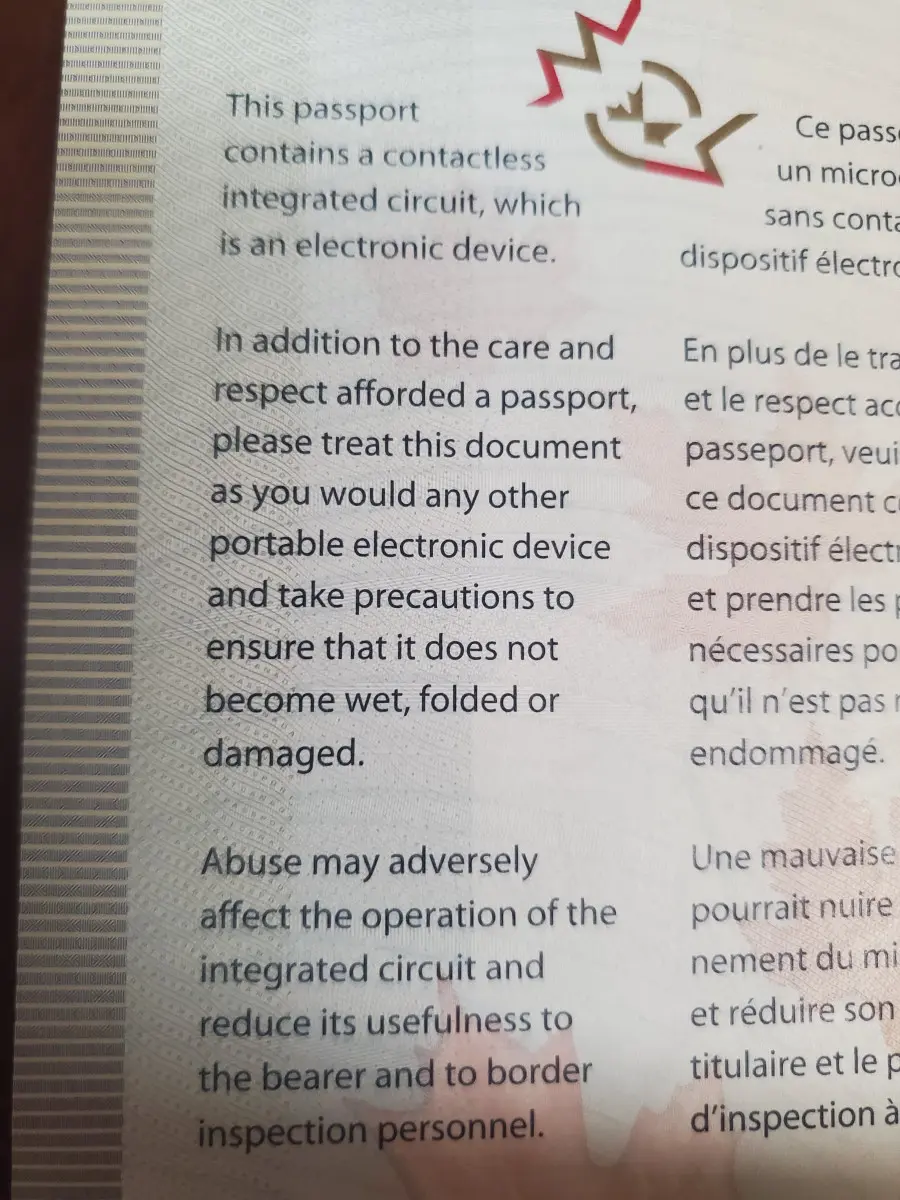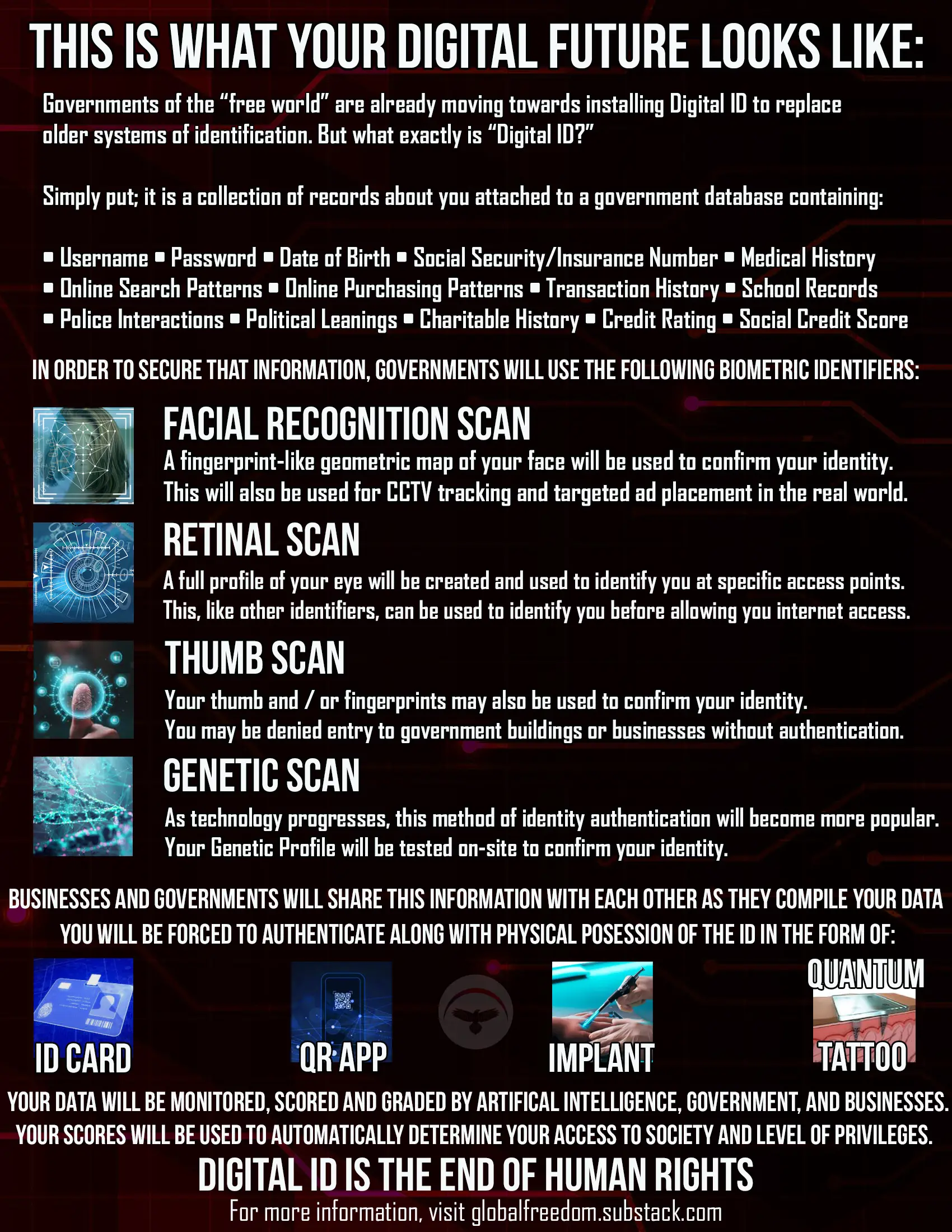101: What is Digital ID?
The rise of technocratic control has justifiably motivated people into taking action and resist the foundational tools of the technocracy. Many of these tools are well positioned to leverage any form of digital ID against you. What forms can Digital ID take?
- A biometric implant?
- A smartphone app?
- Your face?
- A microchip in your passport?

Any and all of these can be used in such a system. There isn’t a specific need to use exclusively and only those. Mass surveillance (online and outside) can make anonymity entirely difficult to outright impossible. This has incredible implications for all kinds of interactions; instead of you getting to choose who (or what) you identify yourself to, you are automatically identified to the system and quite possibly everyone else around you.
Identification
“Who cares if people know who you are?” you may ask. If only it were that simple.
While your identity may not be shared with everyone around you, the system will know. Then almost anything and everything can be used against you.
- That article you read three years ago?
- Someone you’re associated with?
- Religious or political views?
This information has already been used against people. It is impossible to predict what information will be leveraged and how. Once the system is in force it is highly unlikely there will be any transparency or recourse when it is abused. We have already seen how big tech social media and other organizations are eager to misuse information, how much more likely is it to be abused by an even less accountable entity?
Surveillance
The feedback loop driving further data collection is very strong. The more data you have about people the more power you have over them. Even if you’re as careful as possible; your fellow citizens, businesses and services, or even institutions can all be pressured or bribed into divulging information about you.
Even when services and organizations aren’t proactively concerned with what your activities are, they could be using convenient systems that simply collect information in the background.
Devices
“Smart” devices, implants, computers, can all be used to represent you. All that matters is that the system can uniquely identify you. Even if the devices themselves aren’t proactively being used against you, software and services you use can often pick up the slack.
Data sovereignty
Digital ID begins with data. While you can avoid using devices that disclose that data, it’s much harder to prevent state and corporate entities from collecting and sharing the data they have on you. That’s the trouble. Data about you isn’t the same as your data.
The only data you can call “your data” is data that is stored on systems you control. Data about you is near impossible for you to entirely quantify. Surely, if we made sure that everything was stored on a blockchain it would be better! At least more transparent?
Governance
The threats inherent to a mass surveillance and control grid are not solved by changing who’s running it, or what technology it is stored on. With such a system, the people running it are not immune to the all-too-human problem of being corrupted by power. Putting this system it’s own artificial intelligence to determine how it should be run is no better.
Due to the very nature of this kind of control, there is no reason for it to be fair, consistent or even logical. By placing everyone’s destiny inside a centralized control grid you introduce catastrophic failure modes. The failure of every utopian fantasy, of every totalitarian regime, is thinking “this time we have all the information we need to decide everything”.
As we have seen, the very process of collecting every minute detail of everything is itself an inhuman endeavor, and an absurd waste of resources. Fear and distrust has turned people against each other to clamor for a false savior to attack their enemies. Don’t make the mistake of betting against humanity. While human beings have a horrifying capacity for evil, people from all walks of life are capable of great feats of mercy and justice.
Solutions
Don’t fall prey to despair. The propaganda that leads you to believe that these systems of control are inevitable is just that. They can all be dismantled simply and quickly with enough will and effort.
Data economics
Data needs to become a liability instead of an asset. There needs to be serious criminal consequences for misuse of data, and civil liabilities for leaking data about people. If organizations became liable for information they collect, you can imagine how quickly they would start to prioritize the privacy of their patrons and staff.
Embrace the analog
There are all kinds of things that people can do to take back the future and have fun doing it!
- Cash & Coin
- Physical Records
- Non-digital entertainment
- Books
- Board games
- Live music
- Sports
- Community gatherings
- Barbecues
- Dances
- Competitions
- Workshops
- Worship
There is a reason most democracies have codified the right to freely assemble and the right to pursue happiness. Our society becoming more advanced and connected should only enhance our ability to do these things not take away from them.
Support humanity
This agenda thrives on insecurity and desperation. If you were ever waiting for a good time to give to those in need…now is a fantastic time to give to those who need it most. Food banks and shelters have a direct impact on people in your community and can make great use of what you can give.


